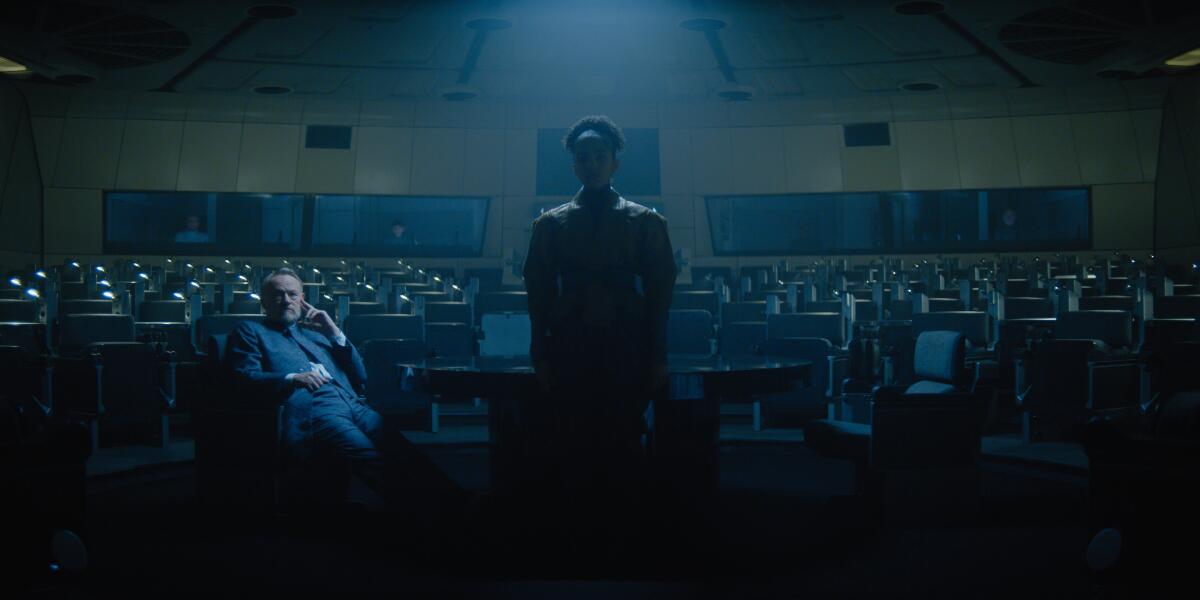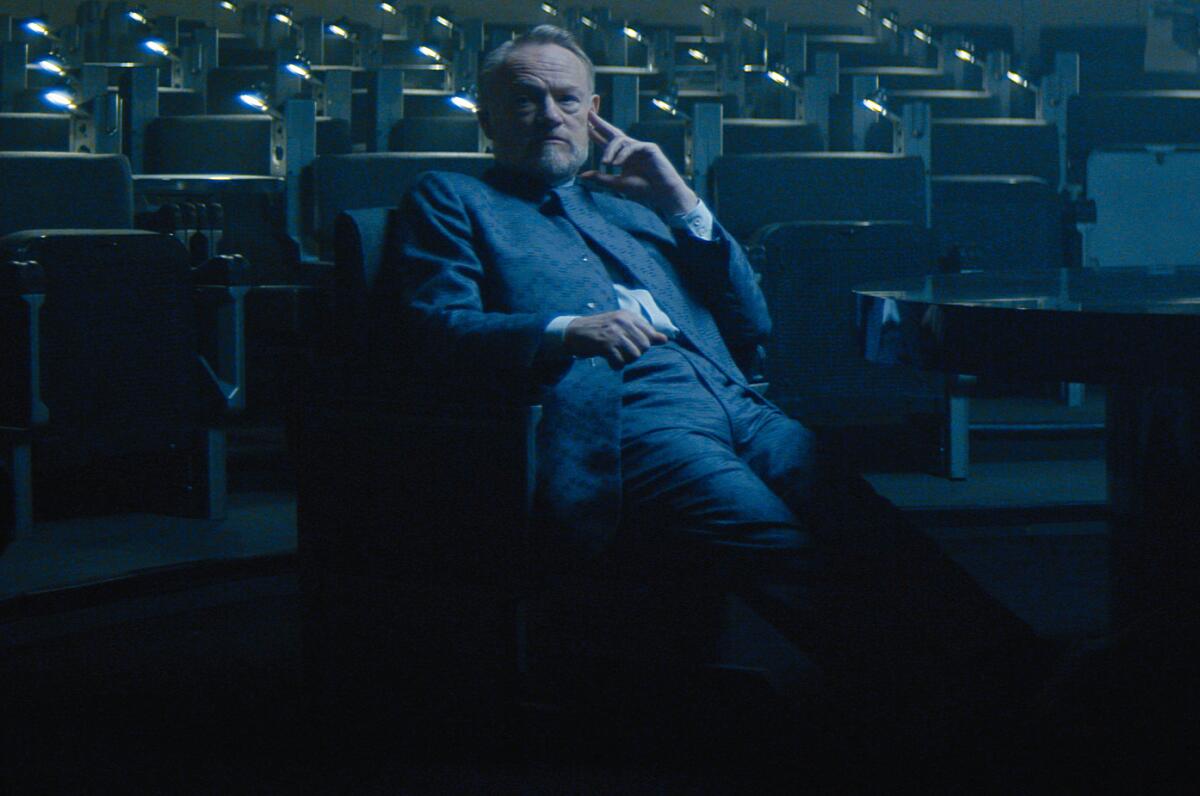Critic’s pick: How Jared Harris sits in a chair in his new TV show

- Share via
“Foundation,” a new science fiction super-extravaganza now unrolling at Apple TV+, is based, after a fashion, on the book of that name by Isaac Asimov. Published in 1951, cobbled together from new material and short stories reaching back into the early 1940s and set in a Galactic Empire that certainly has something to do with the one George Lucas later copyrighted, it’s a book often called “unfilmable.” Having read it, I would say that this is not so much because it is too stylistically complex as that it — as written — is not worth filming. About 90% talk and maybe 3% action, it was inspired by Edward Gibbon’s “The History of the Decline and Fall of the Roman Empire,” and is almost as dry — less a space opera than a salute to diplomacy, brinksmanship and the stratagem that cuts conflict off at the pass. (“Game of Thrones” owes it something.) The book would make a decent radio play, if a humorously antique one.
In any case, series creators David S. Goyer (“Blade,” “Man of Steel”) and Josh Friedman (“The Black Dahlia,” “Avatar 2”) did something else here, creating scenes and relationships to make “Foundation” more conventionally dramatic and exciting and politically contemporary. Many male roles have been gender-swapped — not hard to do when your characters have names like Lors Avakim and Salvor Hardin, and a welcome improvement on a text that is pretty much wall to wall dudes, and pretty sexist whenever a woman peeks in. Some scenes seem written almost just to justify the special effects, which are, indeed, special.
But I’m not here to talk about that. I want to talk about Jared Harris, who plays Hari Seldon, creator of psychohistory — a fictional science that can predict large-scale future events by mathematics — and specifically I want to talk about the way he sits in a chair. It’s near the end of the first episode, and it caught my attention, though I don’t suppose it was supposed to, more than did any of the big, digital set pieces that preceded or followed it.
I understand that you may think this is a little crazy, but I am just being honest.

Seldon is waiting with new protege Gaal Dornick (Lou Llobell) to hear what the rulers of the Galactic Empire are going to do with them. They are less than happy with Seldon’s prediction that the Empire has only a few centuries of gas left in its tank, to be followed by a 30,00-year Dark Age. He has a plan, he says, to cut that down to a thousand years, which involves, among other things, the creation of a great, big Encyclopedia Galactica, to ensure that when the lights come back on humankind won’t have to rebuild civilization from scratch. You will more than likely recognize the outlines of European history. (The series extends the metaphors more globally.)
It’s something about the posture, and particularly his legs. Harris, as Seldon, is slung low in his chair, with his legs shot straight out before him in a way that feels unlike anything I can remember seeing in science fiction. It’s ordinary enough, but it steers the ship in a new direction. His head rests lightly on his left hand, a finger on his temple. He scratches his ear; he scratches his beard. He is not doing anything apparently big in this scene, which follows a more standard Trial Before the Emperors (a trinity of clones in this retelling), and yet he is doing quite a lot. Seldon is not a hero in the usual sense; he’s got no moral beef with the Empire, though it is just the sort of outfit your typical sci-fi hero would naturally rebel against. He’s just a scientist, a man with a plan.
In the upcoming HBO miniseries “Chernobyl,” Jared Harris plays Valery Legasov, the real-life scientist the Soviet government called when an accident at the Chernobyl nuclear power plant was reported.
His posture seems meant to communicate the fact that he’s not worried — he’s done the math — and his apparent relaxation is in itself an expression of control. (There may be a performance element in that as well; Seldon knows they’re being watched.) It’s a picture of authority not quite at rest, the way a cat may be asleep and awake, present and not present at once.
What it is, of course, is acting, that most magical of crafts. (There are many good actors in the series, and Harris is not around for much of it.) He does not merely sit, of course. He stands, he walks, he speaks in his extremely pleasing Jared Harris voice. He does many things with his face that say much without showing much. The way he sits in this scene is a choice, maybe unconscious, maybe just the incidental product of years worth of stepping into characters. (His Lane Pryce was, apart from Peggy and Megan, the most interesting person in “Mad Men”; his Andy Warhol in “I Shot Andy Warhol” is the only portrayal I’ve seen of the artist that contains an actual human; he was a great villain in “Fringe”; a scientist hero in “Chernobyl” — not unrelated to the part he plays here — and a moving King George VI in “The Crown”). And maybe he was asked to sit that way. Yet not just anyone asked to sit that way would sit exactly that way.
‘Foundation’
Where: Apple TV+
When: Anytime (new episodes released Fridays)
Rated: TV-14 (may be unsuitable for children under the age of 14)







